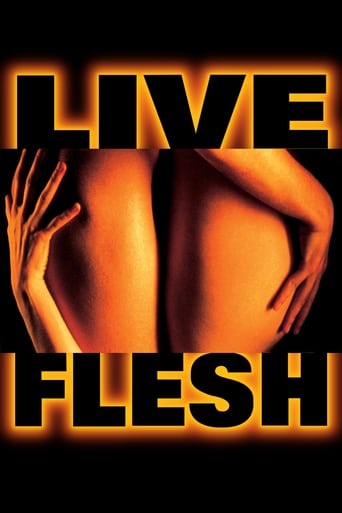dromasca
Watching any film by Pedro Almodóvar is an enriching experience, an experience that teaches the viewers some new things about cinema and some new things about life. Live Flesh ("Carne tremula" in Spanish) is not exception. It is a film about passion and desire, it is a melodrama that makes more sense than life itself, it presents five characters whom we get to know by the end of the film better than our own family.The story has one prologue, one first chapter taking place twenty years later, more chapters in the contemporaneity (meaning 1997) and a prologue a few months later. A young woman (only appearance in this movie as a live person by Penélope Cruz) gives birth, it's the sleepy Madrid at the end of the Franco era, still a policy state, still hard to catch a taxi even if the streets at night are empty, so the birth takes place in a semi-hijacked bus. Twenty years later in bustling democratic Madrid two cops are called to a place where a young 20 years old pizza delivery boy (yes, that boy) has an altercation with a beautiful young prostitute. Shots are being fired, and one of the policemen is hurt and becomes crippled, not before drawing the attention of the young woman. A few years later the boy gets out of jail and plans to revenge the policeman who stole his youth. His revenge involves not only the woman but also the wife of the other cop. We are in full Almodovar melodrama, everybody is in love or makes sex with everybody else, it's not a romantic triangle but a love and passion pentagon. All funny and sexy, violent and endearingThe songs of Chavela Valdez inspired part of the story and the approach of Almodóvar. As in many other of his films he makes no moral judgment about the actions of his characters, but we feel that he cares about them all, and would like to make us care too. Although it's a mix of comedy and melodrama 'Live Flesh' never goes where we expect, because the director and story teller does not run away from mixing the beautiful and tend with the ugly and cruel aspects of life. Javier Bardem performs here in one of the best roles of his early career, and the rest of the team including Liberto Rabal, Francesca Neri, and Ángela Molina define each their characters, each of them with his or her own passion and aspiration to love. Although it is hazard that seems to trigger many of the events, the ending provides a fulfilling sensation. The divinity (I mean, of course, the film director) takes care of everything.
Desertman84
Live Flesh or Carne Trémula in Espanol is a Spanish romantic drama thriller film that is written and directed by Pedro Almodóvar.It stars Liberto Rabal, Javier Bardem, and Francesca Neri. The film is loosely based on Ruth Rendell's book entitled Live Flesh.Live Flesh examines how several lives are changed by a single gunshot. Adapting the novel by Rendell, Almodóvar has given the material a Spanish makeover with added political thrust. Beginning in 1970 in Franco's Madrid, when a prostitute gives birth to a son, Victor, the story leaps forward to contemporary Madrid. Wealthy diplomat's daughter Elena is watching Luis Buñuel's The Criminal Life of Archibaldo de La Cruz while waiting for the arrival of her heroin dealer, and she buzzes Victor,whom she had a one-night stand,into the building. In the confusion that follows, two cops, David and Sancho arrive, and a gun goes off. The story then makes another leap to four years later: Victor is in prison, while Elena, no longer on drugs, runs a disadvantaged children's shelter and is married to wheelchair-bound David. After his release, Victor visits his mother's grave and spots David and Elena at the cemetery -- where David meets philandering wife Clara (Angela Molina). Fate interweaves the tangled interrelationships of all into a complex tapestry of destiny and guilt.Live Flesh is definitely enigmatic as this implausible story with unbelievable twists and turns definitely provides nothing more but mystery and entertainment to the viewer.Despite of its great cinematography,the film basically tries to deviate itself from the common films shown in cinema.But nevertheless,Almodóvar triumphs as he manages to amaze the viewer with his so-called "tricks" as outrageous occurrences feels like realistic.Overall,it become a movie that attacks the mainstream by without any elements of a mainstream feature and it succeeds!!!
Ilpo Hirvonen
Pedro Almodovar is a Spanish director known for his fast-paced stories about prostitution, homosexuality, femininity in masculinity and a bunch of other taboos. He often deals with relation between men and women, sexuality and the different manifestations of it. He ironically studies his own culture, which is strongly masculine. He has given us a lot of satirical portrayals, amazing stories and taught us about the beauty in difference. Almodovar started by making short films in 1970's but moved to full length features in the 80's. In 1990's he was highly appreciated in the world of cinema and in 1997 he brought us a new growth story Live Flesh.In 1970's a woman gives birth to a boy in a vacant bus: at the very same night the boy is named Victor and he is granted the ability of traveling via Spanish buses free of charge. 20 years later Victor meets a woman, who couldn't be less interested in him; still Victor cannot get her out of his mind. A series of events and coincidence lead the characters to their own paths, which walk into each other as time goes by.Pedro Almodovar has never been my number one personal favorite, but I've always enjoyed his films: he is a very good storyteller plus his films are hilarious portrayals of the macho-society. The greatest thing in his work is the fact that he has been going up all the time. Film by film he has outdone himself. After Live Flesh he made All About My Mother and Talk to Her, both of which are amazing films and I consider the latter to be his true masterpiece.With regards to the philosophy of film in the work of Almodovar, I see existentialism behind it. His characters are often prostitutes, poor youngsters, people who haven't planned their lives, people who haven't planned to become prostitutes. There is no destiny that guides them. Just as in the films by Eric Rohmer in Almodovar's the events build around coincidence and everything is led by it. All that happens, happens because of coincidence or the minor choices by the characters. Such as David getting into the accident and falling in love with Elena, because of Victor's choice.The existentialism in Almodovar's films is especially from Jean-Paul Sartre. He was a French atheist existentialist who took a lot of influence from Kierkegaard and Heidegger for instance. Sartre said that man is just thrown into this world and by one's actions and choices defines one's own existence. "Man is condemned to be free; because once thrown into the world, he is responsible for everything he does. It is up to you to give life a meaning."Live Flesh is basically a growth story - the growth story of Victor, from his birth to his twenties and the film particularly portrays the growth of his love. Live Flesh is a film, which is both funny and sad, bitter and sweet. It's about love and the yearning of it: a timeless film about love to cut a long story short. The film includes some hilarious ironic descriptions of Spanish men. It works very well just as it is but it is quite interesting to look below the surface: into the philosophy of film and intricate themes and taboos.
tedg
Almodovar at least does two things for me.—He touches on deep stuff without pretending that he has to do so in a story. Thus he avoids moralizing and is able to maintain all sorts of ambiguities and overlaps between different parts of the world. Oh, there's always a story, but they are so soap opera-ish and delivered so jauntily that they actually separate from the movie.—He does everything cinematically. He really has an eye that is a treasure. Every element of what we see, WE SEE. It isn't explained. It isn't in dialog that we happen to overhear, we see it. Not only does he use a cinematic vocabulary to deliver the main goods, but similar devices are used to show us that it is a layered structure.He mixes television (in several modes), old movies, and out of body narrative. Often dreams and visions. Paintings, photographs and postcards and in this case an imagined ending (after "Taxi Drviver). Often one or more characters is a generator of public stories; here it is a wounded cop who becomes a wheelchair basketball star.He's not my favorite Spaniard, and this isn't my most valued of his films. But its hard to better than any visit from Pedro.Its an honestly vaginal world (with the connection among several layers being there) and I suppose therefore most women will actually think the story matters.Ted's Evaluation -- 3 of 3: Worth watching.



